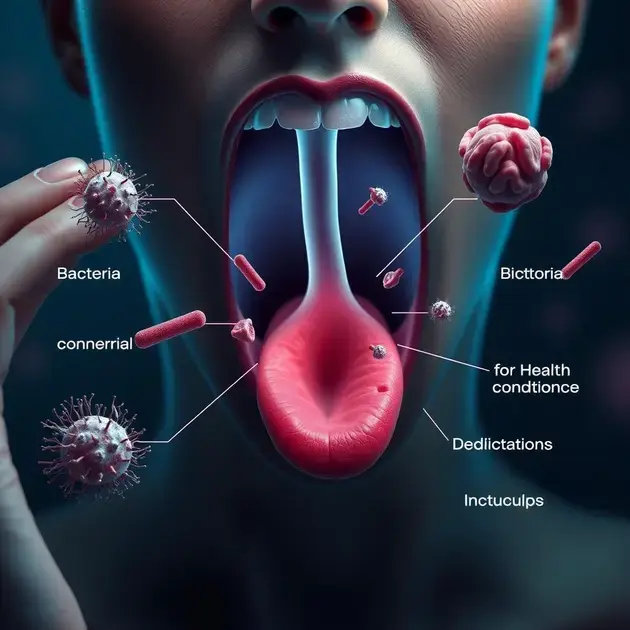Understanding the causes of bad breath is crucial for maintaining not only oral health but also for bolstering personal confidence and social interactions. Often overlooked, this common condition affects millions globally and can lead to significant psychological distress. While many associate it purely with poor dental hygiene, recent studies reveal a more complex picture involving factors such as diet, health conditions, and even certain medications.
One of the primary contributors to bad breath is the presence of bacteria in the mouth, particularly those residing on the tongue and between teeth. These bacteria are responsible for the breakdown of food particles and the release of foul-smelling gases. Moreover, conditions like dry mouth, sinus issues, and systemic diseases like diabetes can exacerbate bad breath, highlighting the importance of a comprehensive approach to diagnosis and treatment. By recognizing these varied causes, individuals can seek appropriate remedies and adjustments to alleviate the problem.

Understanding Potential Causes of Bad Breath
Bad breath, also known as halitosis, can be caused by a variety of factors. One of the most common causes is poor oral hygiene. Not brushing and flossing regularly can lead to the buildup of bacteria in the mouth, which can produce unpleasant odors. To combat this, it is essential to brush your teeth at least twice a day and floss daily. Using a tongue scraper can also help remove bacteria from the tongue, another common source of bad breath.
Another potential cause of bad breath is dry mouth. Saliva helps cleanse the mouth and remove particles that can cause odor. If you suffer from dry mouth, consider using saliva-stimulating products or chewing sugar-free gum to increase saliva production. Staying hydrated by drinking plenty of water throughout the day can also help alleviate dry mouth and reduce bad breath.
Additionally, certain foods and beverages can contribute to halitosis. Foods like garlic, onions, and spices can leave strong odors in the mouth that linger even after brushing. Avoiding these foods or taking extra care to clean your mouth after consuming them can help minimize their impact on your breath. Similarly, cutting back on coffee and alcohol, which can dehydrate the mouth and lead to bad breath, may also be beneficial.
Furthermore, underlying medical conditions such as gum disease, respiratory infections, and digestive disorders can also cause bad breath. It is important to address these issues with the help of a healthcare professional to effectively manage halitosis. Regular dental check-ups and cleanings are crucial in identifying and treating any oral health problems that may be contributing to bad breath.
In conclusion, understanding the potential causes of bad breath is the first step in combating this common issue. By maintaining good oral hygiene, staying hydrated, watching your diet, and addressing any underlying health concerns, you can improve the freshness of your breath and boost your overall oral health.
The Role of Bacteria in Bad Breath Formation
Bacteria play a significant role in the formation of bad breath. The mouth is home to various types of bacteria, some of which can produce foul-smelling compounds as they break down food particles and other substances. These volatile sulfur compounds (VSCs) are often the culprits behind halitosis. To address this, it is important to target the bacteria in the mouth to reduce their ability to produce VSCs.
One effective way to combat bacterial growth in the mouth is by using antibacterial mouthwash. Look for mouthwashes that contain ingredients like chlorhexidine or cetylpyridinium chloride, which can help kill the bacteria responsible for bad breath. Incorporating mouthwash into your oral hygiene routine, particularly after brushing and flossing, can significantly reduce bacteria levels and promote fresher breath.
In addition to using mouthwash, regular brushing and flossing are crucial for keeping bacteria at bay. Brushing removes plaque and food particles that bacteria feed on, while flossing helps clean between the teeth where bacteria can hide. Using a toothpaste with antibacterial properties can also help inhibit bacterial growth and reduce the risk of bad breath.
Furthermore, maintaining a balanced diet can impact the bacterial composition in the mouth. Consuming probiotic-rich foods like yogurt and kefir can promote the growth of beneficial bacteria that compete with odor-causing strains. Avoiding excessive sugar and refined carbohydrates, which can feed harmful bacteria, may also help maintain a healthier bacterial balance in the mouth.
Overall, understanding the role of bacteria in bad breath formation is essential for effectively addressing halitosis. By targeting the bacteria through proper oral hygiene practices, using antibacterial products, and promoting a healthy bacterial balance, you can reduce bad breath and improve your oral health.
Exploring Other Factors Contributing to Bad Breath
While bacteria and poor oral hygiene are primary contributors to bad breath, there are other factors that can play a role in halitosis. One such factor is smoking or tobacco use. Smoking not only dries out the mouth, leading to reduced saliva production and increased bacterial growth, but it also leaves a lingering odor on the breath. Quitting smoking or using tobacco products is essential for combating bad breath.
Another common factor in bad breath is sinus or respiratory infections. These conditions can lead to postnasal drip, which can contribute to a persistent bad taste and odor in the mouth. Treating the underlying infection with medications and nasal irrigation can help alleviate these symptoms and improve breath freshness.
Furthermore, certain medications can cause dry mouth as a side effect, leading to bad breath. If you suspect that your medication may be contributing to halitosis, speak to your healthcare provider about potential alternatives or strategies for managing dry mouth. Adjusting your medication regimen may help reduce the impact on your breath.
In some cases, digestive issues like acid reflux or gastrointestinal disorders can also be linked to bad breath. These conditions can cause stomach acids to rise up into the esophagus and mouth, leaving a sour or unpleasant taste. Managing these digestive issues through dietary changes, medication, or other treatments can help alleviate bad breath symptoms.
Overall, exploring these additional factors contributing to bad breath can help you identify the root cause of your halitosis and take appropriate steps to address it. By addressing smoking habits, treating infections, managing medication side effects, and addressing digestive issues, you can improve the freshness of your breath and boost your overall oral health.

Identifying Common Food Triggers for Bad Breath
Bad breath, also known as halitosis, can be caused by a variety of factors, including the foods we eat. Identifying common food triggers for bad breath is essential in managing this condition effectively. Some foods, such as garlic and onions, are notorious for causing bad breath due to their strong odors. Other common culprits include certain spices, dairy products, and acidic foods.
To pinpoint which foods may be triggering your bad breath, it is important to keep a food diary and note any instances of halitosis after consuming specific items. Pay attention to how your breath changes after eating different foods and try to identify any patterns. Additionally, foods that are high in sugar or protein can contribute to bad breath by providing a breeding ground for bacteria in the mouth.
Some lesser-known food triggers for bad breath include coffee, alcohol, and certain types of fish. These foods can linger in the mouth and lead to unpleasant odors. To combat bad breath caused by food triggers, it is important to maintain good oral hygiene practices, such as brushing and flossing regularly, as well as staying hydrated to help flush out food particles and bacteria.
Overall, being mindful of the foods that may be contributing to your bad breath can help you make informed choices to improve your oral health. By identifying and avoiding common food triggers for bad breath, you can take proactive steps to keep your breath fresh and pleasant.
How Medications Can Affect Your Breath Odor
Medications play a crucial role in managing various health conditions, but they can also have unintended side effects, including changes in breath odor. Understanding how medications can affect your breath odor is important for maintaining good oral health and overall well-being. Certain medications, such as antibiotics, antihistamines, and antidepressants, can cause dry mouth, which in turn can lead to bad breath.
Additionally, some medications may chemically alter the composition of saliva, making it more hospitable to odor-causing bacteria. This can result in a foul-smelling breath that is difficult to mask with traditional oral hygiene practices. It is essential to communicate with your healthcare provider about any changes in breath odor you experience while taking medications.
In some cases, your healthcare provider may be able to adjust your medication dosage or recommend alternative treatments to alleviate the issue. Maintaining good oral hygiene, including regular brushing, flossing, and using mouthwash, can also help mitigate the effects of medication-related bad breath. Staying hydrated is crucial in preventing dry mouth and promoting saliva production, which can help combat odor-causing bacteria in the mouth.
By being aware of how medications can affect your breath odor and taking proactive steps to address any issues, you can better manage this common side effect and maintain fresh breath while taking necessary medications.
The Link Between Poor Oral Hygiene and Halitosis
Poor oral hygiene is a leading cause of halitosis, or bad breath, and can significantly impact your overall oral health. Failing to brush and floss regularly allows bacteria to accumulate in the mouth, leading to the formation of plaque and tartar. These bacteria produce foul-smelling gases that contribute to bad breath.
Inadequate oral hygiene practices can also result in gum disease, which is characterized by inflammation, bleeding, and infection of the gums. The presence of gum disease can exacerbate bad breath, as the bacteria associated with this condition release volatile sulfur compounds that give breath its unpleasant odor. Treating gum disease through professional cleanings and good oral care habits is essential in combating halitosis.
Furthermore, neglecting to clean the tongue properly can also contribute to bad breath. The rough surface of the tongue provides an ideal environment for bacteria to thrive and produce odorous compounds. Using a tongue scraper as part of your daily oral hygiene routine can help remove bacteria and debris from the tongue’s surface, reducing the likelihood of bad breath.
Overall, maintaining a consistent oral hygiene routine that includes brushing twice a day, flossing daily, and visiting your dentist regularly is crucial in preventing halitosis and promoting good oral health. By addressing the link between poor oral hygiene and bad breath, you can take proactive steps to ensure fresh breath and a healthy smile.
Conclusion
In conclusion, understanding the common food triggers for bad breath is crucial in maintaining effective oral hygiene. Foods like garlic, onions, spices, dairy products, and acidic foods are known culprits for causing bad breath due to their strong odors. By keeping a food diary and identifying which foods may be triggering bad breath, individuals can make informed choices to improve their oral health. Additionally, staying hydrated and practicing good oral hygiene habits can help combat bad breath caused by these food triggers.
When it comes to medications, being aware of how they can affect breath odor is essential for overall well-being. Certain medications, such as antibiotics and antihistamines, can lead to dry mouth and subsequently bad breath. Communicating with healthcare providers about any changes in breath odor while taking medications is key. Maintaining proper oral hygiene practices, including regular brushing, flossing, and staying hydrated, can mitigate the effects of medication-related bad breath.
Poor oral hygiene is a significant factor in halitosis, impacting overall oral health. Neglecting regular brushing and flossing allows bacteria to accumulate in the mouth, leading to plaque and tartar formation and foul-smelling breath. Addressing gum disease through professional cleanings and good oral care habits is crucial in combating bad breath. Proper tongue cleaning with a scraper can also reduce the likelihood of bad breath, promoting a healthy smile and fresh breath.
